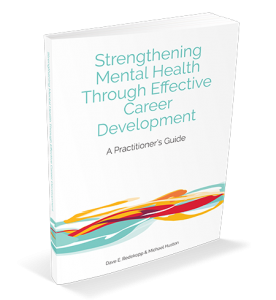This review was originally published in the Australian Centre for Career Education’s CEAV E-Journal in spring 2020.

As a reader from a different theoretical background, I nevertheless found the prose highly accessible, the intentions clear and the evidence brought to bear well-referenced, balanced and supportive of the basic premise, which is that effective career development interventions can have a positive impact on mental health and that the two areas are therefore closely related and would benefit from dialogue and exchange, as opposed to being perceived as somehow in competition with one another.
“The work is not only thought-provoking and academically rigorous, but also presents a well-structured, useful and encouraging professional tool.”
Career development counsellors are not mental health professionals, and vice versa. This work is not trying to muddy that distinction, nor to undermine the important and unique work done in each domain. The work is rather a two-headed appeal, firstly for those outside of the fields – notably policy-makers and resource allocators – to appreciate the powerful and important connections between these professional domains, and secondly for those within the fields to seek dialogue, mutual understanding and co-operation.
Overview
The introduction (Chapter 1) situates the work within its professional domains and identifies its intended audience, frankly states the important distinction between “evidential support” and “proof,” and provides a particularly clear and detailed roadmap for the rest of the text and recommendations on which part to read depending on the interests and motivations of the reader. Chapter 2 argues for the necessity of highlighting the links between career development and mental health, particularly in the current upsurge in interest and resources devoted to the latter. Chapter 3 tackles some key concepts germane to the discussion – such as the distinctions between mental health and mental illness on the one hand, and between career development and work on the other – and provides definitional points of reference for the remainder of the text. Chapter 4 discusses contemporary research linking work and mental health. The authors note that there is considerable evidence indicating the powerful positive influence of work on mental health (and indeed vice versa) but considerably less demonstrating links with career development.
Chapter 5 presents a framework to articulate the links between career development and mental health, which the authors call the Career Development Effects Model. This is a long chapter that lays out and supports the model in detail with frequent use of case histories and examples. Chapter 6 discusses and defines the concept of “stress” and its relationship to career development and to work. The chapter presents practical ways that careers guidance professionals can help mitigate stress and proposes a combined model unifying the Career Development Effects Model developed in Chapter 5 with this stress coping approach.
More from Dave Redekopp and Michael Huston
Career development and mental health: How can I practise ethically? (Careering magazine)
How career development is also a mental health practice (CareerWise)
Chapter 7 is a frank exploration of the ethical and competency boundaries between career guidance and mental health. It is explicit regarding the responsibilities of career guidance professionals to develop their own awareness of the evidential bases for the positive mental health impact of their work as well as to carefully consider the ways in which they communicate these impacts to clients, colleagues and mental health professionals. This chapter provides clear advice for existing careers guidance counsellors to help them overcome any hesitation or anxiety they may have in acknowledging the direct influence that their work has on the mental health of their clients. Chapter 8 extends the theoretical exploration of chapter 7 into a detailed practical guide for the career development practitioner to effectively integrate mental health outcomes into their working practices. Chapter 9 zeroes in on specific language and interpersonal skills that can be employed by career guidance counsellors to effectively implement the ideas presented in the previous chapter.
Chapter 10 addresses the ongoing need for communication beyond the careers development sector. It considers ways in which careers guidance professionals can gather and present evidence of the positive mental health impact of their work as part of an ongoing sector-internal – and more importantly public – awareness raising effort. The chapter provides specific and detailed resources by way of guidance and suggestion.
In Chapter 11, the authors acknowledge that they are encouraging career guidance professionals to expand their circle of influence through stakeholder engagement and advocacy, which is likely not something that many of them will spontaneously be comfortable with. The chapter therefore provides step-by-step guides, explanations and rationales for stakeholder engagement methodologies.
In conclusion, Chapter 12 returns to the need for, and to the inevitable benefits of, more robust links between careers guidance and mental health, not only for greater and mutually beneficial professional exchanges between the two domains but moreover (and more importantly) for greater transparency and effectiveness of these highly related services for those who use them, or who come to depend upon them at some critical juncture in their life. The authors cite the Public Health Agency of Canada’s definition of mental health, which includes “the capacity of each and all of us to feel, think, act in ways that enhance our ability to enjoy life and deal with the challenges we face.” The authors end with a call to action for all implicated in the preceding discussion to be part of a movement toward greater exchange, mutual understanding and co-operation between careers guidance and mental health.
I would highly recommend Redekopp and Huston’s work not only to careers guidance counsellors and mental health professionals but also to government policy-makers, directors of any organization that has careers guidance or mental health support as part of its purview, as well as to a general interested audience. It is an excellent and inspiring piece of work.




